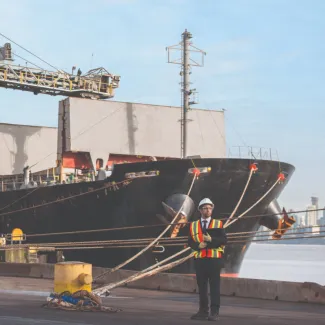Navigating success: Lucky Garg’s journey in maritime operations

Lucky Garg was hired as a marine operations coordinator at the Vancouver Fraser Port Authority, where he served as the first point of contact for all operational correspondence to the Vancouver Fraser Port Authority. He was responsible for making decisions to ensure the safe and efficient movement of the marine and land supply chain, and for monitoring the safety and security of the port.
Why did you decide to do the MEL in Naval Architecture and Marine Engineering?
After completing my undergraduate degree, I began working for an international shipping company as a deck cadet onboard a ship, and I then worked for almost five years as a navigation officer. I had a lot of experience working on ships and was interested in learning more about operations and leadership.
The Master of Engineering Leadership (MEL) in Naval Architecture and Marine Engineering program offered a sound balance between academic theory and real-world industrial and commercial practices, making it a perfect match for what I was looking for.
How did you get the summer internship position at the Port of Vancouver?
The MEL in Naval Architecture and Marine Engineering includes a three-month internship. Unfortunately, most of the positions available through UBC Co-op were for those with marine engineering experience. So I began an online job search, reaching out to as many people as I could in the marine industry.
I contacted the Harbour Master Office at the Port of Vancouver, and they followed up with an interview. They considered my experience, background and the MEL program curriculum and then offered me a summer intern position as a marine operations coordinator with the port.
Tell us about your job
As a marine operations coordinator, I was the first point of contact for all operational correspondence through the Vancouver Fraser Port Authority. Operating within the Operations and Security department, under the authority of the Harbour Master, I had to make real-time decisions to ensure the safe and efficient movement of marine and land supply chains, and to monitor the safety and security of the port.
I also had to respond to incidents to ensure proper and effective action was taken during critical early stages to minimize impacts on port operations and the environment.
In addition to monitoring the real-time activities within the port, I was an information source for operational insight into port regulations and guidelines, both internally and externally.
Did your MEL courses help prepare you for this job?
Many of the technical classes focus on marine engineering and design, whereas my job was in operations. Yet the coursework definitely helped me in my position. Operations encompass a broad range of disciplines – including vessel management and maintenance – that I am familiar with from my work experience and technical classes at UBC.
The business courses also prepared me for this job. When you’re working on a ship, leadership tends to be very autocratic. The MEL classes on leadership and communication have all been helpful in the more fluid situations you find yourself in outside that more rigid environment.
I’ve learned about different leadership styles and strategies, improved my communication skills and explored how to contribute to and be part of an effective team.
What’s next?
I have one more semester to finish before completing my degree. Due to my study permit conditions, I am currently on call at the port in case of emergency and to cover other people’s shifts, and if things work out, I will be joining them full-time in January 2023.
Anything else you want to share?
I could not have gotten this internship without the MEL. The UBC brand name and the industry recognition of this program definitely helped get me hired, as did being the recipient of the Wilbur N. Landers Graduate Scholarship from the Society of Naval Architects and Marine Engineers. Having said that, I worked very hard to get this position.
Early on, I attended some MEL professional development workshops, including how to reach out to people on LinkedIn, and I took this advice to heart, connecting to literally hundreds of people to ask about the industry and see if they had any potential positions available.
The internship was a great learning opportunity and represented many firsts – it was my first time working in a Canadian organization and my first time working in an office environment as well!





